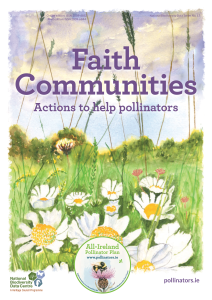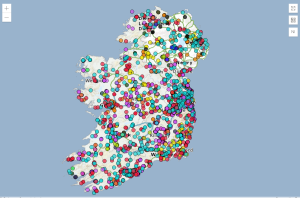Faith Communities
Faith Communities across the island are being called on to take actions to help save our bees. Faith Communities often own large areas of land and can lead the way in managing our landscape to better support and enhance all nature and creation.
This multi-denominational guide suggest 24 practical actions that any Faith Community can take. They are based on scientific research and are the measures that are most likely to benefit Irish pollinators.
Some of the actions include:
- Mowing areas of grass using a pollinator-friendly regime
- Installing a bee hotel
- Raising awareness in your faith community
- Organising a congregation action day
- Planting pollinator friendly bulbs, trees, shrubs and flower beds and reducing the use of pesticides.
To view the guideline document for Faith Communities, click here
The importance of bees and pollinators
Pollinators, especially bees, make up an important part of Ireland’s biodiversity. Unfortunately, Irish pollinators are in decline, with one third of our 99 bee species threatened with extinction. Without pollinators it would be impossible for farmers or gardeners to affordably produce many of the fruits and vegetables we need for a healthy diet. Pollinators are also vital for a healthy environment and landscape.
Bees are reliant on pollen and nectar for food, with hunger being one of the biggest causes of decline. “If you’re a pollinator, finding enough food is the greatest challenge you face.” said Dr Úna FitzPatrick from the National Biodiversity Data Centre, who is responsible for coordinating the All-Ireland Pollinator Plan. She added “ground around Centres of Worship, presbyteries, convents, graveyards as well as gardens of those in the congregation can play a crucial role if they are managed as safe places where our wild bees and other insects can find food and shelter.”
“The All-Ireland Pollinator Plan is a call to action to all of us. Yes, bees are declining, but we know exactly what we need to do to reverse these declines, and the actions needed are very doable and will show results almost immediately. In the coming years, we are looking forward to working with Faith Communities to make small changes on their land, which will have huge impacts for bee conservation and biodiversity in Ireland.” Dr Fitzpatrick continued.
Care of our common home
Faith Communities have a special calling to protect nature and creation. For Roman Catholics, the launch of these guidelines could not be timelier. Laudato Si’ – on care for our common home, published by Pope Francis in 2015, emphasises that this planet is a home that we share with all other creatures. It calls us to ‘hear both the cry of the earth and the cry of the poor’. Laudato Si states that ‘Nature cannot be regarded as something separate from ourselves or as a mere setting in which we live. We are part of nature, included in it and thus in constant interaction with it.’ It asks all of us to make an ecological conversion both at a personal and at a social and community level to protect the whole of creation. The All-Ireland Pollinator Plan offers a practical and realistic way in which faith communities can embrace the ethos of Laudato Si’.
“As religious people, our faith should encourage us to get to know the natural world more thoroughly, understand what is threatening biodiversity more fully and do all we can to create a friendly world for every creature. The suggestions in this Guide are excellent and, if implemented, will help save biodiversity and our pollinators as well” said Fr. Seán McDonagh of the Columban Ecological Institute.
Pledge your faith community for pollinators
You can pledge your faith community for pollinators by adding it to the online map ‘Actions for Pollinators’, and join a network of gardens, schools, businesses, and other faith communities all over the island of Ireland which are being managed for pollinators.
Find out more on the Actions for Pollinators map here, and click ‘sign up’ in the top right corner.
All-Ireland Pollinator Plan
In September 2015, Ireland joined a small number of countries who have developed a strategy to address pollinator decline and protect pollination services. More than 80 governmental and non-governmental organisations have come together to form a shared plan of action, to help pollinators and improve biodiversity across the island. Implementation of the Plan is coordinated by the National Biodiversity Data Centre. It involves everyone from farmers, to councils, schools, gardeners, local communities and businesses doing their bit. Today the Pollinator Plan is calling on Faith Communities to play an active role.
To view the guideline document for Faith Communities, click here


